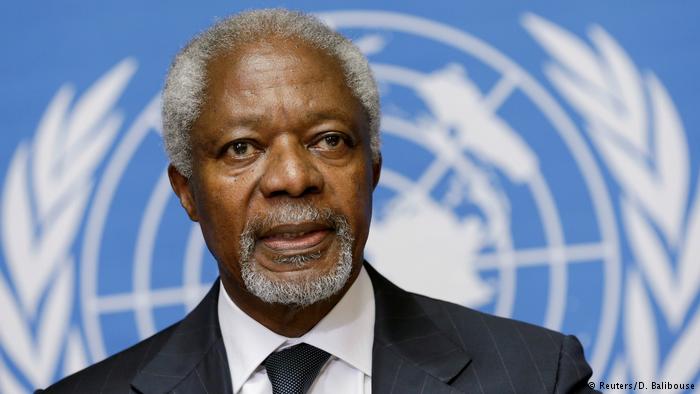It is no longer news that the former UN Secretary-General, Kofi Anan renowned for his soft-spoken diplomacy with world leaders in times of crisis, ove
It is no longer news that the former UN Secretary-General, Kofi Anan renowned for his soft-spoken diplomacy with world leaders in times of crisis, over the weekend at a clinic in Geneva, Switzerland, at the age of 80. What many perhaps don’t know is that besides being the first black African to take up the role of UN Secretary-General, serving from 1997 to 2006, he was a consummate diplomat and a human rights activist who won a Nobel Peace Prize in 2001 for his human rights work at the UN.
In fact his last public appearance was in Harare, Zimbabwe, last month when he appealed for a peaceful poll before the general election despite his failing health. Observers said at the time that Kofi Annan seemed hesitant as he delivered a speech and appeared unwell. As chairman of The Elders, an international group of diplomats brought together by Nelson Mandela, Mr Annan was there to urge Zimbabweans to bring lasting peace to their country.
Besides his outright condemnation of the Iraq war, Annan was an outspoken critic of Tony Blair’s decision to join US forces in the 2003 invasion of Iraq. A week before the invasion he warned that military action would violate the UN Security Council’s charter. He had earlier said that an invasion would lead to a breakdown in inter-national order and that there should have been a second UN resolution authorising war on Iraq. In September 2004 he went further and condemned the invasion as illegal. Asked outright at that time during an interview if it was illegal, he said: ‘Yes, if you wish. I have indicated it was not in conformity with UN charters. From our point of view and from the charter’s point of view it was illegal.’
Born into an aristocratic family of Ashanti tribal chiefs in Kumasi, Ghana, in 1938, Kofi Anan who was at the forefront of battling against AIDs in Africa, urging the free distribution of anti-retroviral medication, is still revered as a Ghanaian who never forgot his roots and who maintained contact with his local community throughout his life. He attended college in Kumasi, then won a Ford Foundation scholarship to Minnesota, in the US, where he gained a degree in economics in 1961. He started his career at the World Health Organisation, going on to join the United Nations in New York where he was to serve as a diplomat for most of his adult life.
In 1990 he negotiated the release of hostages in Iraq after Saddam Hussein’s invasion of Kuwait. He persisted in efforts to achieve peace in Iraq and was appointed Secretary-General of the UN in 1997, the first black person to take the top job. Two years later he held talks with Hussein. He is widely acknowledged as having revolutionised the UN’s top-heavy bureaucracy and prioritised human rights, climate change and the need for equality in the world economy. He was given an honorary knighthood by the Queen in a private audience at Buckingham Palace in 2007, the year when he left the UN and set up his Kofi Annan Foundation dedicated to promoting better governance in ‘a fairer, more peaceful world’.
He headed talks to establish peace in Kenya after post-election violence in 2017 when more than 1,000 people were killed. Elsewhere in Africa Kofi Annan worked to combat an HIV/AIDS epidemic. Two years ago he led a UN commission investigating the Rohingya massacres in Myanmar. He published his memoirs, ‘Interventions: A Life In War And Peace in 2012.’
Twice married with two children, a daughter Ama and a son Kojo, Kofi Anan passed away peacefully on Saturday 18th August after a short illness with his children and wife, Nane by his side.
